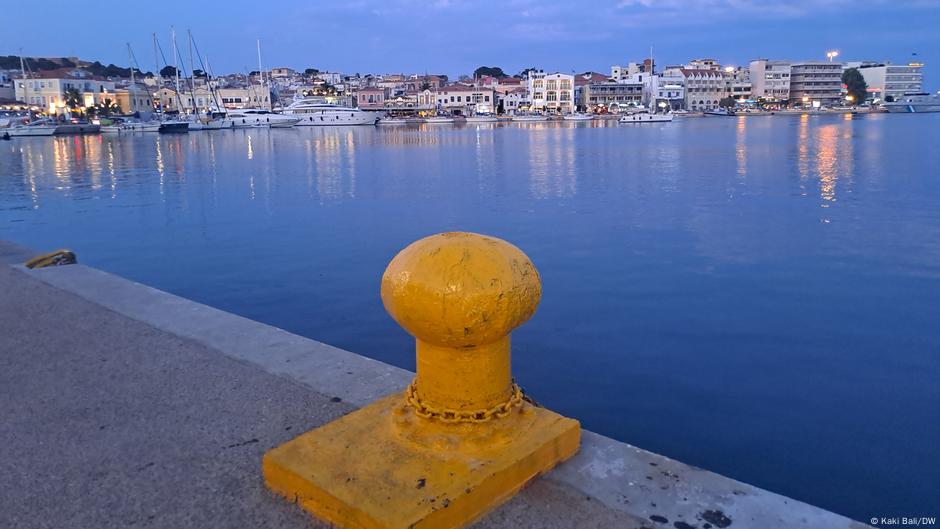
Growing Tourism Between Greece and Turkey
The turquoise waters and cozy towns of the Greek Aegean island of Lesbos are attracting a growing number of Turkish tourists, who seem to be welcomed by their hosts. This influx raises an important question: can tourism help improve the complex and often tense relationship between Greece and Turkey?
This summer, well-heeled tourists from the Turkish coast, across the Aegean Sea, are arriving in large numbers at Skala Sikamineas on the northeast coast of Lesbos. The area is bustling with activity, with two excellent fish restaurants on the coast fully occupied. At lunchtime, Turkish is the dominant language spoken.
Families with children from the Turkish city of Izmir, a group from the port city of Ayvalik who arrived via the new catamaran connection, and a young couple from Istanbul are among those enjoying the picturesque setting. Isin and her boyfriend, visiting the island for the first time, shared their positive experience. “Friends told us a lot of good things about Lesbos, and we decided to come here for a few days,” Isin said. They traveled by ferry from Dikili, loved the beaches and taverns, and are already planning to return next summer.
The journey takes just under an hour, with a ticket costing around €35. In summer, there are eight trips a day from Dikili to Mytilene, the island’s capital. On the Greek side of the Aegean, the atmosphere is more relaxed for Turks who enjoy having a drink or for Turkish women who want to sunbathe in their bikinis.
“I feel very comfortable here,” Isin said as her boyfriend poured an ouzo. The affordability of the trip makes it accessible for many Turkish travelers, contributing to the increasing number of visitors.
A Surge in Turkish Tourists
In July alone, nearly 29,000 tourists from Turkey visited Lesbos, with even more expected in August. Local restaurateurs are thrilled with the influx of guests from the neighboring country. Takis, who runs a tavern in Gera Bay, shared his positive experience. “They appreciate the good food, they like to drink our famous aniseed schnapps ouzo, they are not stingy, and most of them are very friendly and relaxed,” he said. He added that the visitors are primarily from the Turkish middle class, seeking a quiet place to relax.
Many Greek islands have become unaffordable for average earners on both sides of the Aegean, but Lesbos remains a more affordable option compared to Turkish destinations such as Bozcaada, Bodrum, or Assos. This affordability has made it an attractive choice for Turkish tourists.
Historical Context and Modern Relations
Since the rebellion of Greeks within the Ottoman Empire in the early 19th century, which led to the establishment of an independent Greece, and the Greco-Turkish War ending in 1922, relations between the two countries have been complex. However, tourism has played a role in improving these relations.
The people of Lesbos are no more or less nationalistic than other Greeks, but they now have more opportunities to meet the “enemy” from across the sea in peace. Turkish tourists in Mytilene are not seen as invaders but as welcome guests.
Nikos Giannakas, the deputy mayor of Mytilene responsible for tourism, welcomed the arrival of the mayor of Balikesir in Turkey. Ahmet Akin traveled to Lesbos along with 150 tourists via the new catamaran route. The new line connects Mytilene with Ayvalik and is the eighth such route between Lesbos and Turkey, including connections to Izmir and Petra.
According to Giannakas, this new route will boost tourism and trade between Lesbos and Turkey, offering more travel options and strengthening cross-border relations. Last year, approximately 120,000 people came to Lesbos by boat from Turkey, and the goal is to welcome even more visitors in 2025.
Political Tensions and the Role of Tourism
Tourism and cooperation on refugee and migration issues are the only enduring success stories in Greek-Turkish relations since Prime Minister Kyriakos Mitsotakis and President Recep Tayyip Erdogan signed a friendship and cooperation agreement in December 2023. While both governments show political will to discuss more complex issues, progress remains slow.
Key issues include the demarcation of maritime borders, airspace disputes, and territorial waters. Turkey demands consultation on Greece's plans to lay a power cable between Crete and Cyprus. When not consulted, it sends warships to the Aegean Sea, as seen off the coast of Kasos in the fall of 2024.
Recent tensions escalated when Athens announced the establishment of two new marine parks in the Ionian Sea and southern Aegean. The Turkish Foreign Ministry criticized the move, stating that unilateral actions in closed or semi-closed seas should be avoided. In response, Turkey presented its own maps of "protected marine areas" in the northern Aegean and eastern Mediterranean.
Despite these political disputes, Turkish tourists on Lesbos remain focused on enjoying the island’s beauty and hospitality. For them, the political tensions are distant concerns, overshadowed by the charm of the Aegean.
